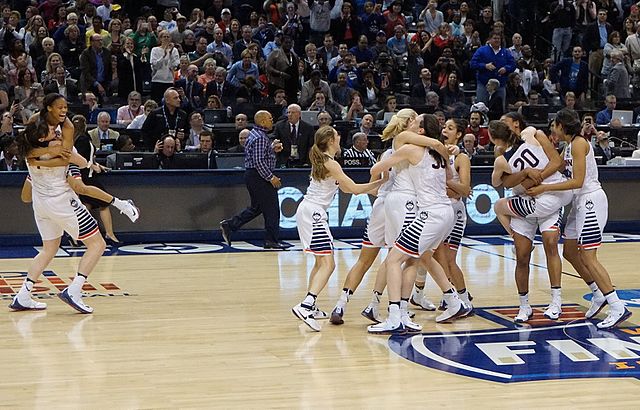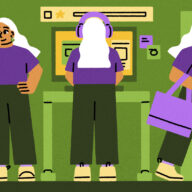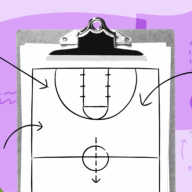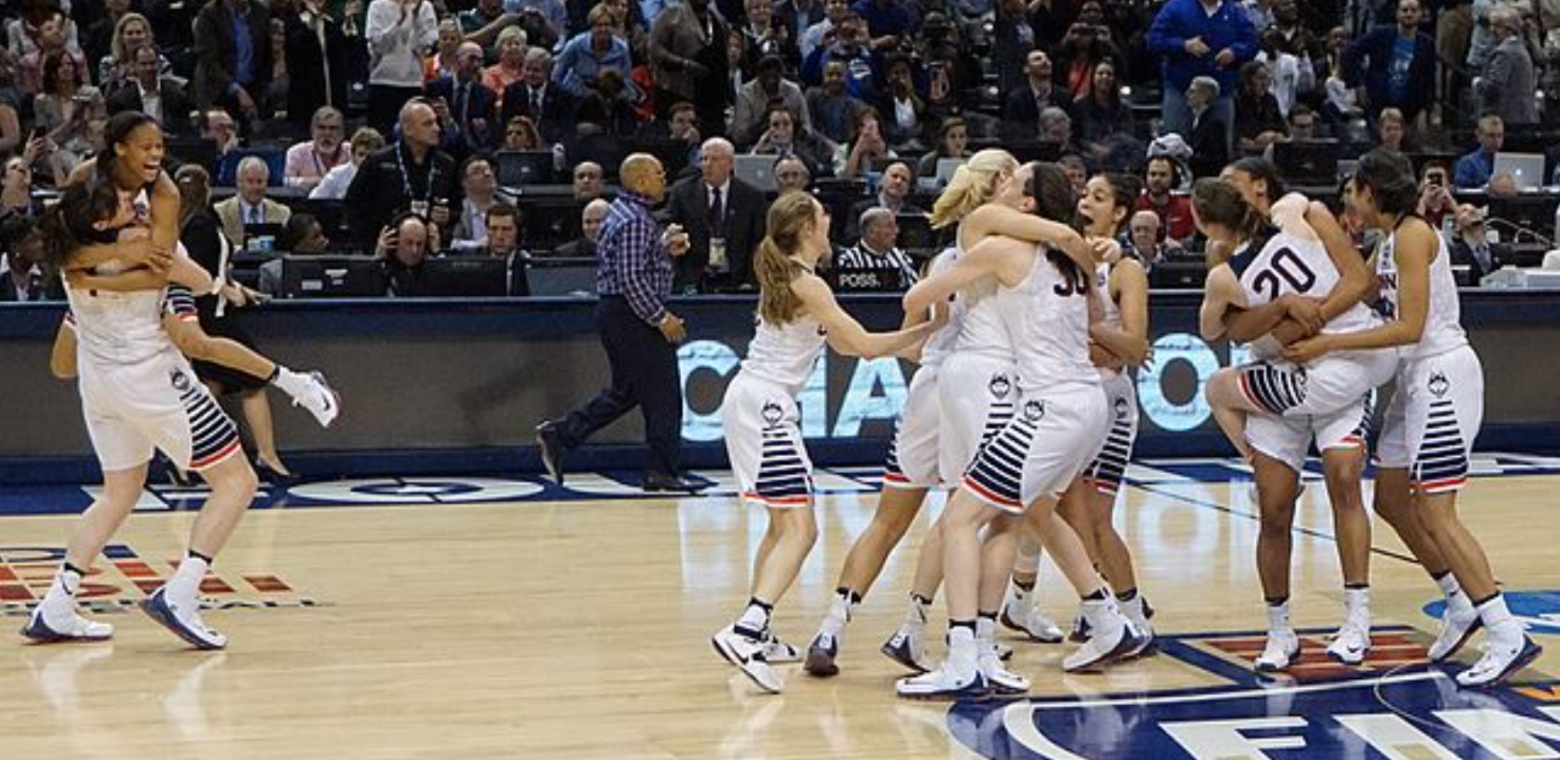UConn finally lost, but here’s why they’re still winners
Just after my first season coaching my seven-year-old son’s YMCA basketball team, a friend posted this video on Facebook:
Geno Auriemma, the head coach of the women’s basketball team at the University of Connecticut. His team’s 111-game winning streak, the longest in history, was recently snapped.
My heart just soared watching this. First off, everything he says is true. I know this from playing basketball, coaching basketball, and from being on teams of all kinds. I know it in my bones.
Attitudes make a difference. Encouragement goes a long way.
Take a look at the Golden State Warriors. They jump around and high five each other after every play. These are grown men, mind you, stars all their basketball lives, the coolest of the cool. And they’re the envy of the NBA because — get this — they act like they enjoy playing basketball together. (And word is, they actually do.)
Now watch other teams. Yes, there’s a fair amount of jumping off the bench and hooting when someone on the floor dunks, but consistent celebration? For things like good passes and nice screens? What about encouraging hand slaps for failed plays?
Not so much.
In most situations, the too-cool-for-school attitude — what Auriemma rails against most, poison to good team culture — abounds. Watch the Warriors pass the ball around on each possession (they lead the league in assists), ultimately finding an open player for a basket. The collective enthusiasm afterward is palpable.
Just like Auriemma’s Huskies. I direct you now to the win column of both these teams. Notice anything?

Compare these examples to, say, the Oklahoma City Thunder, whose point guard Russell Westbrook (a leading league MVP candidate, ironically) likes to dribble the ball for an entire possession and then takes a shot. He makes a lot of them, but nobody on his team goes out of their way to congratulate him.
That’s because playing basketball and never touching the ball sucks. It doesn’t matter if the Russell Westbrooks or the Kobe Bryants of your team are hot. You’re just standing around watching them play.
The little guys aren’t sure yet, they need encouragement
Auriemma’s comments also made me think of my son, Jackson. Not the best player on our team, nor the worst, but the one thing he has in spades (and this isn’t just fatherly pride talking) is enthusiasm. All season he celebrated the made baskets and nice plays of his teammates as if he’d done something well himself. (Full disclosure: we’re Warriors fans.) It’s just in his nature. I’m talking about jumping around, big smile on his face, hollering: “Nice shot, Emeka!”
It was infectious. Many of the other boys seemed uncertain about the proper reaction to plays not their own. Should they cheer? Act nonchalant? Should they do anything?
Even at seven and eight, I observed that nasty tendency to look around to see what’s cool — cool, like a four-letter word. But the best part was: they weren’t sure yet. So I told them. Enthusiasm’s cool! I could see it there in all of them, behind the sparkle in their youthful eyes, just waiting to be released. They just needed encouragement. They, like all of us, needed to understand what it really means to be a good teammate.
I got the lucky three-month opportunity to prevail upon my little charges with repetitions of: “This is your team. These are your teammates. Enjoy playing together!”
After all, what I’m really talking about is love of the game.
By the end of the season, I’m proud to say enthusiasm — especially for the success of others — was the rule, not the exception.
Enthusiasm’s Greek root is enthous “possessed by a god, inspired” (based on theos ‘god’). In other words, en + theos = in spirit. When you’re being enthusiastic, you’re full of the spirit!
Yeah, but would you really bench your star player?
When I shared this video to my Facebook, a buddy of mine replied: would you really bench your star player for a bad attitude? For sulking, for bad body language?
My first reaction: hell yes.
When pressed, I had to concede it depends. A coach goes by feel and instinct; every situation is different. If the “star” is having an off night and is bummed and sulking about it, benching him or her might not be the right call. But, if a player is always too cool for school, always sulking and finding no excitement in anything but his own success, then, like Coach Auriemma, I’d show that player to a cozy spot on the bench. Moreover, I’d rather not have that player on my team at all.
If you’re only focussed on what you do well, you’re not a good teammate. You’re a good player, maybe, but not a good teammate.
Because, and I repeat: attitude counts. It’s powerful to celebrate the successes of your teammates. It lays the foundation for good team culture which, almost secondarily, tends to show up in the win column. But teams with strong team culture win no matter what the W-L columns show.
Team culture helps teams win, through success and failure
When Auriemma talks about the type of kid he’s interested in, he’s talking about selecting for team culture. The team culture he wants, and his players create. Some have said (and Auriemma acknowledges this) that it’s easy for him to have such high standards because of the strong reputation of his team. After all, he has the all-time winningest team. He can be choosy about his recruits.
How do you think that started?
Too often, people espouse the concepts of team culture without doing what’s necessary to create a strong team culture. Powerful team culture (on the order of the UConn Huskies and the Golden State Warriors) involves trust, enthusiasm, and solidarity. Your team won’t work well together as a team if its members are mostly concerned about themselves.
What is your team culture? What are your team’s values? Try running a play from the Atlassian Team Playbook called Rules of Engagement. It’ll help you answer these questions and codify your culture.
What’s more, consider how your team reacts to the failures of teammates. Do they quickly look to distance themselves? Leave somebody hanging? See vulnerabilities to exploit, enhancing their own reputation?
In high school, I finally got in a game at a time when it really mattered. (I normally got to play when we were up by at least 20 points, late in the game, what’s known, embarrassingly, as garbage time.) It was mid-second quarter, and the other team was at the free throw line. I wasn’t lined up along the key, I was nearer half court where guards sometimes stand to get an angle on an outlet pass. When the ball left the shooter’s hand, I had a hunch it might come off the back of the rim and I moved towards the key. Sure enough, the ball popped out high and over the line-up and I got the jump on the rebound and grabbed it. A fast break was possible and my team sprinted past me like a stampede, eager to take part in this developing play. I turned to pass quickly up court, but a defender racing by baited me and jumped sideways — a trick to steal my pass. I saw him, and held the ball, but it threw me off balance and I had to make a rushed dribble… which I did off my foot and out of bounds.
In the game 15 seconds and already I’d committed a turnover.
But just then, when I was feeling as low as you can on a basketball court, my teammate Jimmy ran up, yanked my jersey like a comrade-in-arms and yelled, “Don’t worry about it, Cuz! We know you can ball.”
One of the best teammate gestures I’ve ever received.










































